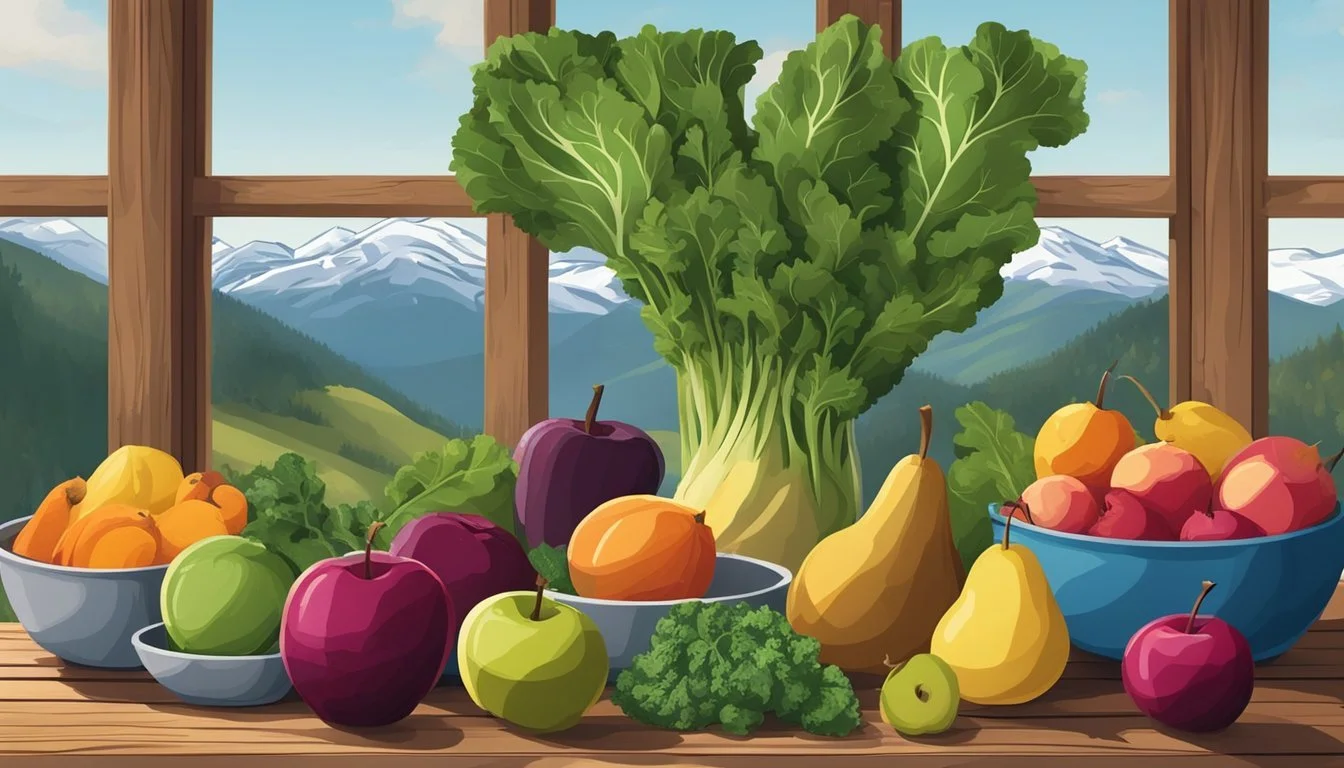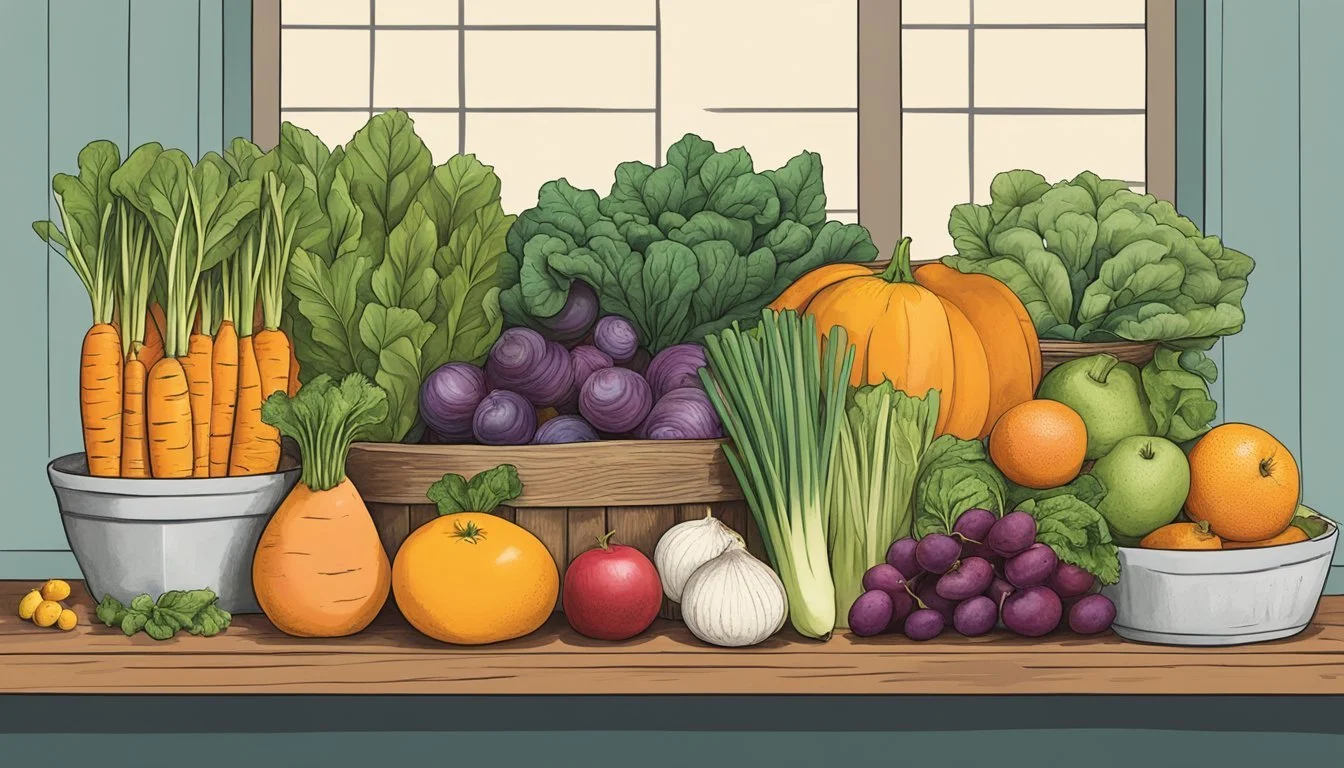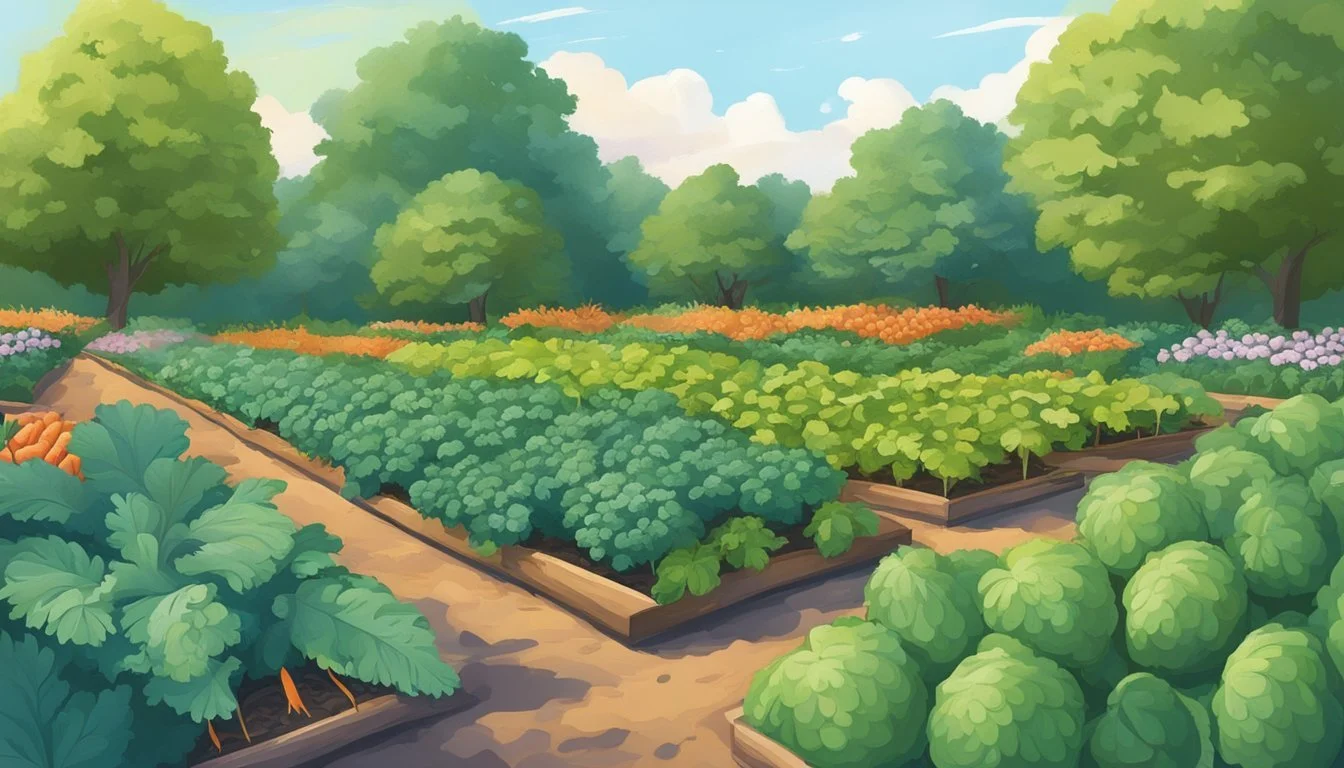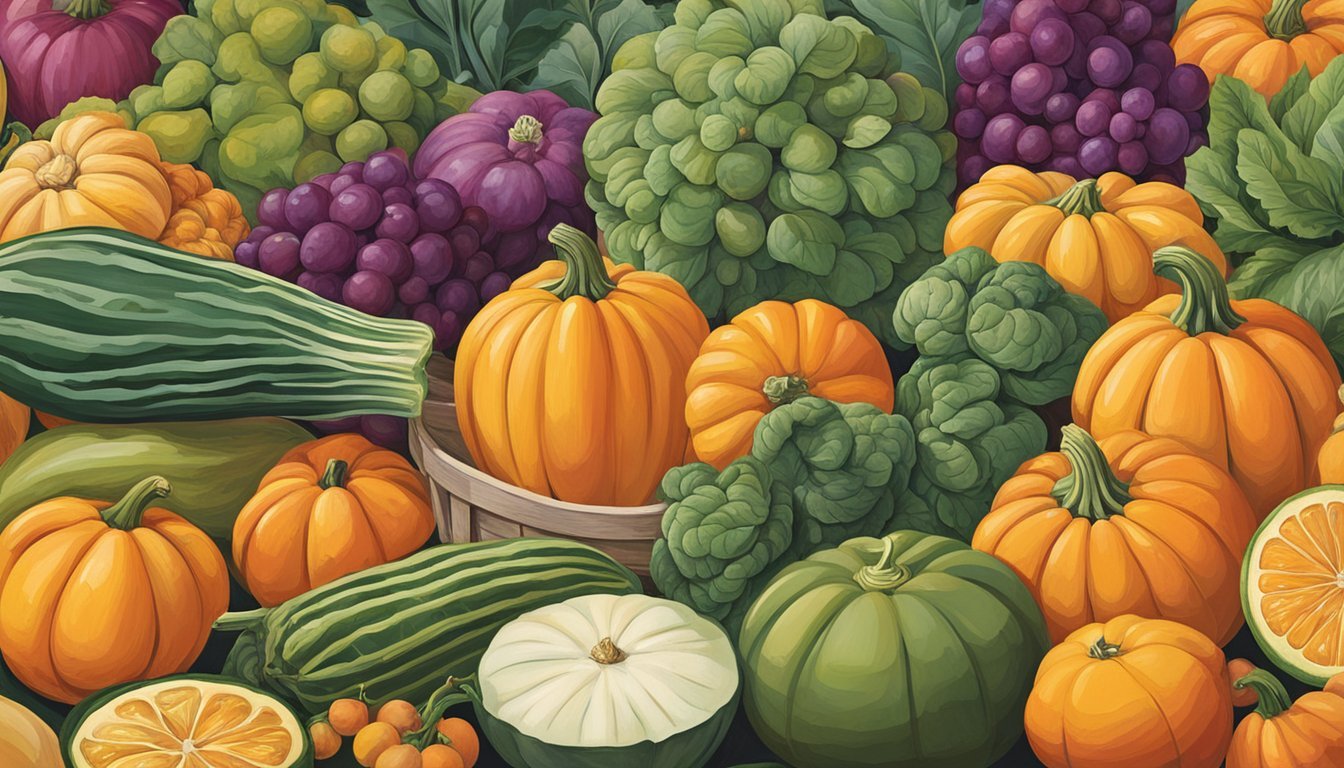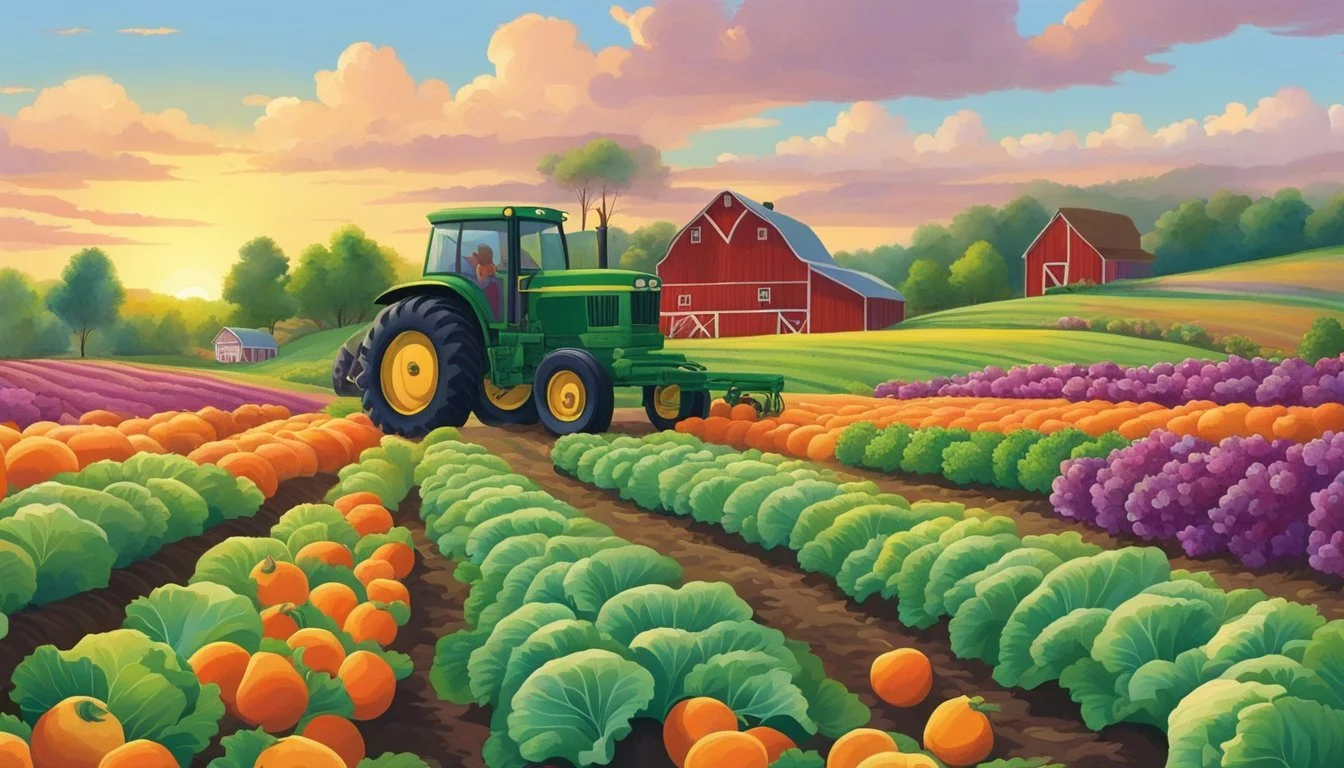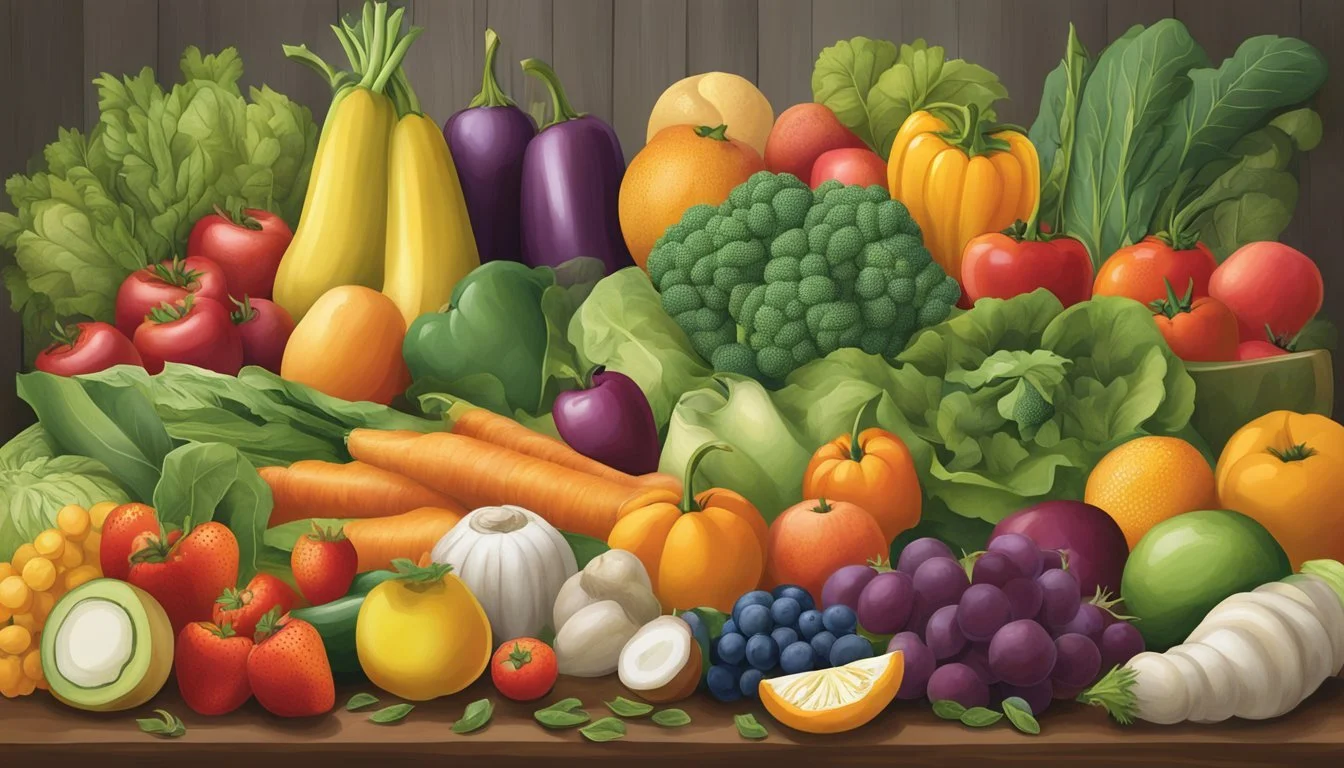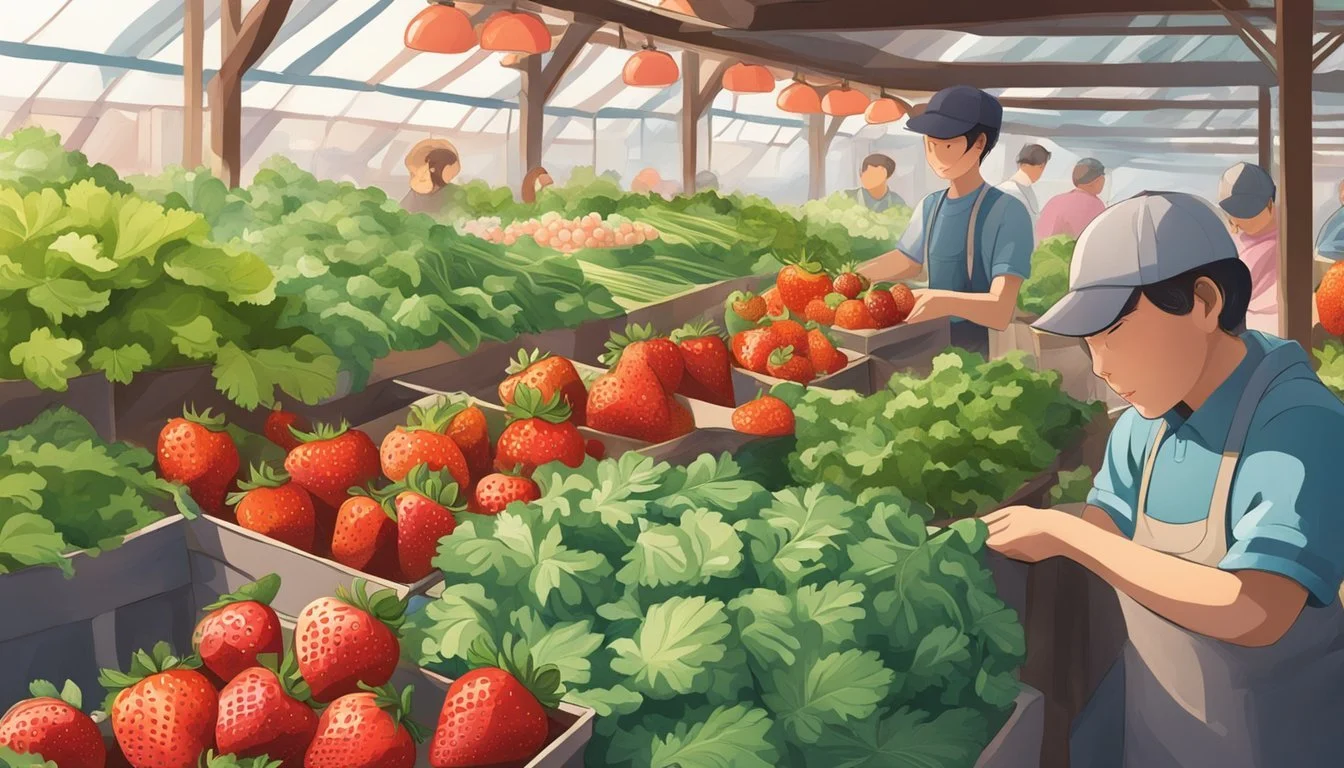Tennessee Seasonal Fruit & Vegetables in February
Your Fresh Picks Guide
This Article is Part of our Tennessee Seasonal Fruit & Veg Calendar
February in Tennessee heralds a pivotal moment for both fruit and vegetable enthusiasts and local producers, reflecting the state's diverse agricultural landscape. Despite the chill still palpable in the air, Tennessee’s farms begin to hint at the forthcoming spring with a selection of produce that flourishes in the cooler climate. Root vegetables and some hearty greens typically withstand the winter months, while the promise of early spring offers a different variety of fresh produce.
The state's unique geography, which includes the Appalachian Mountains and the Mississippi River Valley, influences the seasonal availability of certain crops. Tennessee's farmers work within these regional climates to cultivate produce that is ready to be harvested even in the cooler months. Consequently, residents and visitors alike have access to fresh, locally grown fruits and vegetables that are not only nutritious but also support the local economy and sustainable agricultural practices.
Aside from the stalwart presence of winter storage crops like potatoes and onions, February also sees the late winter harvest of robust greens, such as kale (What wine goes well with kale?) and collards, which can endure the cold. Moreover, this month also marks the height of citrus availability, a boon for those craving fresh, bright flavors amidst the heavier winter fare. Adhering to the season not only allows individuals to enjoy produce at its peak but also lessens the environmental impact by reducing reliance on long-distance transportation.
Understanding Tennessee's Seasonal Climate
Tennessee’s climate varies significantly across the state, impacting what fruits and vegetables can thrive during different seasons. In February, residents experience the tail end of winter, with considerations for hardiness zones influencing planting and harvesting.
February Weather Overview
In Tennessee, February is characterized by cold temperatures as winter persists. The average high temperatures range from the mid-40s to the low 50s (Fahrenheit), while the average lows generally hover between the mid-20s and low 30s. One should expect variable conditions that can include freezing nights, occasional snowfall in certain regions, and the potential for early spring-like days as the month progresses. This fluctuation impacts which crops are viable during this time.
Tennessee Hardiness Zones
Tennessee is divided into multiple plant hardiness zones as defined by the United States Department of Agriculture (USDA). These zones are critical for understanding what plants can survive the winter climate of a particular area. The zones range from 5a in the mountainous eastern regions to 7b in the warmer western valleys.
Eastern Tennessee: Zones 5a to 6b
Central Tennessee: Zones 6a to 7a
Western Tennessee: Zones 7a to 7b
The hardiness zones inform gardeners and farmers of the earliest dates for planting to ensure the survival of their crops. Even within Tennessee, there is a large range of growing season lengths, and February may be a time for planning rather than planting in areas with colder climates.
Seasonal Produce in February
February in Tennessee brings a variety of produce that is ready for harvest. This range highlights the seasonal availability of fruits and vegetables, offering optimal freshness and flavor.
Vegetables Available
Cruciferous Vegetables:
Collard Greens
Kale
Root Vegetables:
Sweet Potatoes
Turnips
Fruits in Season
Citrus:
Blood Oranges
Berries:
Pomegranates
One should note that the climate and specific regional conditions in Tennessee can influence the exact timing of the availability of this produce.
Popular Winter Crops
In February, Tennessee's climate supports a variety of cool-season crops, especially leafy greens and select root vegetables that withstand lower temperatures.
Leafy Greens Harvest
During this month, Tennessee gardens abound with leafy greens. Kale and collard greens are robust and can survive frost, offering crisp leaves perfect for hearty dishes. Spinach (What wine goes well with spinach?), with its quick growth cycle, is another reliable choice for winter harvest, flourishing in colder weather.
Kale: Full sun; Rich, well-draining soil; Harvest when leaves are palm-sized
Collard Greens: Full sun to partial shade; Harvest by picking the lower leaves
Spinach: Full sun; Harvest before bolting for best flavor
Root Vegetables Peak
Root vegetables like carrots, turnips, radishes, and beets are at their peak in Tennessee during February. Their growth underground shelters them from the chill, and they can often become sweeter with a touch of frost.
Carrots: Full sun; Sandy, loose soil; Harvest when fingers can gauge size beneath soil
Turnips: Full sun; Moist, well-drained soil; Harvest when bulbs are 2-3 inches in diameter
Radishes: Full sun to partial shade; Harvest when roots are less than an inch wide
Beets: Full sun; Fertile soil with good drainage; Harvest when 1-3 inches in diameter
Potatoes, a staple root crop, are typically planted in February as they require a longer growing period before harvesting later in the season.
Preparing and Storing Seasonal Produce
As February in Tennessee brings colder temperatures, the proper preservation of fruits and vegetables becomes paramount to extend their usability. Freezing and drying are both effective methods that can ensure your produce remains consumable well past its season.
Freezing Techniques
When freezing vegetables, one should blanch them first to preserve texture, color, and nutritional value. Blanching involves briefly boiling vegetables and then plunging them into ice water. Here’s a straightforward guide to blanching times for common February produce:
Greens (like spinach and kale): 2 minutes
Root vegetables (like turnips and radishes): 3 minutes
Broccoli and cauliflower: 3 minutes
After blanching, dry the vegetables thoroughly before sealing them in airtight, freezer-safe bags or containers. Label each package with the date of freezing.
For fruits, which are more delicate, one can follow these steps to freeze them properly:
Wash and gently pat the fruit dry.
Cut into pieces if necessary and remove pits or cores.
Spread in a single layer on a baking sheet to freeze individually.
Once frozen, transfer them into airtight bags or containers.
This method prevents fruits from clumping together, making it easier to use individual portions as needed.
Drying Methods for Preservation
Drying is suited for many fruits and some vegetables, concentrating flavors and sugars. One can use a food dehydrator or an oven on its lowest setting to dry produce. Thinly sliced apples and pears from Tennessee are ideal candidates for drying due to their high pectin (how long does pectin last?) and fiber which aid in texture retention.
Here is a basic drying procedure:
Slice fruits or vegetables uniformly for even drying.
Pre-treat to prevent browning if necessary (e.g., a dip in ascorbic acid for fruits).
Arrange in a single layer on drying racks or baking sheets.
Turn the pieces occasionally to promote even drying.
Store in a cool, dark place in airtight containers to extend shelf life.
Each method has its own set of guidelines, but the principles of ensuring cleanliness, proper preparation, and storage apply across the board for preserving the integrity of Tennessee's seasonal produce.
Growing Your Own Produce
In Tennessee’s variable February climate, gardeners can take advantage of indoor and outdoor gardening strategies to cultivate a thriving home garden.
Winter Gardening Tips
During the colder month of February, Tennessee gardeners should focus on protecting their perennial plants and preparing for the upcoming spring. Mulching and row covers offer insulation for overwintering plants, keeping them from freezing during unexpected cold snaps. It's particularly important to monitor the weather and apply layers of mulch to root vegetables like carrots and parsnips that can remain in the ground.
A gardener might find benefit in planting cold-hardy crops outside if the ground is workable. Lettuce, spinach, and some varieties of kale can tolerate frost and should be considered for late winter planting. Utilize cold frames or hoop houses to extend the season and shield these plants from harsh conditions.
Starting Seeds Indoors
Starting seeds indoors is a proactive approach to ensure that one's garden has a head start when the warmer spring weather arrives. Here is a concise seed starting schedule:
Plant Type Seed Start Date Tomatoes 6-8 weeks before the last frost date Peppers 8-10 weeks before the last frost date Broccoli 6-8 weeks before the last frost date Cauliflower 6-8 weeks before the last frost date
When starting seeds indoors, the gardener should use sterilized containers and seed-starting mix to prevent diseases. It's imperative to provide sufficient light sources such as grow lights, and to keep the soil consistently moist. Precise temperature control, often between 65-75°F (18-24°C), is also crucial for optimal seed germination.
Tennessee's Seasonal Recipes
In February, Tennessee's seasonal cuisine showcases winter produce like squash and a bounty of hearty vegetables. Chefs and home cooks take advantage of these ingredients to create warming dishes that are both nutritious and delicious.
Winter Squash Dishes
Winter squash becomes the star in Tennessee kitchens during the colder months. Acorn, butternut, and spaghetti varieties offer a sweet, nutty base for Squash Casserole or a creamy filling for Stuffed Squash. These squashes are also ideal for Roasting, which can bring out their natural sweetness and make for a simple yet satisfying side dish.
Roasted Acorn Squash Wedges: Wedges seasoned with a touch of cinnamon and brown sugar, roasted until tender.
Butternut Squash Risotto: Creamy risotto with pureed butternut squash, Parmesan cheese, and a hint of sage.
Hearty Vegetable Soups
Soups in February draw on the heartiness of local produce. Staples include Beans and Greens, which not only provide a depth of flavor but also contribute essential nutrients. A classic Bean Soup made with navy or pinto beans (how long does pinto beans last?) is both comforting and filling.
Collard Green & White Bean Soup: Long-simmered collard greens with tender white beans in a rich vegetable broth (how long does vegetable broth last?).
Vegetable Bean Chili: A robust chili featuring a variety of beans and winter vegetables, topped with a dollop of sour cream or shredded cheese.
Agricultural Events in February
In Tennessee, February is a time when agriculture begins to stir from its winter rest. Seasonal events focus on the preparation for spring planting and include a blend of markets and educational opportunities that cater to both farmers and the general public.
Farmers' Markets
Despite the colder weather, some farmers' markets in Tennessee remain open in February, offering winter produce and goods. They operate as hubs where consumers can find a variety of local foods, artisan products, and sometimes, live entertainment. Markets vary by location, but many Tennessee farms contribute to these community gatherings with seasonal offerings, like winter greens and root vegetables.
Example Markets in February:
Nashville Farmers' Market: Open year-round with both indoor and outdoor sections.
Chattanooga Market: Indoor Winter Market offers a selection of seasonal produce and local crafts.
Educational Workshops
Agricultural extensions and farms in Tennessee often host workshops during February to educate on various farming techniques and upcoming agricultural trends. These workshops are instrumental for farmers planning their planting season and for garden enthusiasts seeking to expand their knowledge.
Potential Workshop Topics:
Tree Pruning: Best practices for fruit and ornamental trees to ensure health and productivity.
Spring Vegetable Planting: Guidance on starting seeds and preparing soil for spring crops.
Educational events vary by region and are designed to address the specific needs and challenges of Tennessee farmers and gardeners.
Supporting Local Farms
When consumers choose to purchase their fruits and vegetables from local farms and orchards in Tennessee, they're doing more than just obtaining fresh produce. They are participating in a system that bolsters the local economy, supports community health, and preserves agricultural heritage.
Buying seasonal produce directly from Tennessee farms establishes a connection between the consumer and the origin of their food. Local orchards can offer a variety of fruits that are picked at the peak of ripeness, ensuring maximum flavor and nutritional value. The act of purchasing locally also contributes to a reduced carbon footprint due to decreased transportation distances.
Farmers' markets and farm stands are commonplace in Tennessee, making it convenient for individuals to support local agriculture. Many farms offer the opportunity for customers to pick their own produce, which can be an engaging experience that promotes a deeper understanding of food sourcing.
Here is a list of potential benefits when supporting local Tennessee farms:
Freshness and taste of produce due to minimal transit time
Strengthened local economies through direct support of farmers
Reduced environmental impact from lower transportation emissions
Preservation of local farmland and rural livelihoods
Direct relationship with growers, offering transparency in food production
In February, the selection of seasonal produce might include winter staples such as:
Vegetables Fruits Kale Apples Collards Turnips
Engaging with Tennessee's local farms and orchards offers a unique opportunity to not only enjoy fresh produce but also contribute positively to the community and environment.
Conclusion
February in Tennessee is a time of preparation and anticipation in the world of agriculture. As the last month of winter, gardeners and farmers are focused on planting early-season crops and preparing for the spring to come.
Seasonal Considerations:
Climate: Gardeners should be mindful of the unpredictable weather and potential for frost, which can affect planting times and crop viability.
Soil Preparation: It's crucial to prepare the soil for early crops, incorporating organic matter to enrich it.
Harvest Opportunities: While most crops are not yet in full swing, there might be some late-winter harvests of hardy vegetables. For instance, crops like turnips and winter greens might still be collected in early February.
Crops to Plant in February: Tennessee farmers might start planting the following vegetables, considering the specific climate of their region:
Spinach
Kale
Radishes
These crops are generally frost-tolerant and suitable for early planting. It’s essential for growers to always check local frost dates and adjust their planting schedules accordingly.
Key Points for Gardeners and Consumers:
Consumers should look for remaining winter crops, such as root vegetables and hearty greens, while awaiting spring's bounty.
Gardeners should focus on preparing the groundwork for a successful harvest season ahead.
As the month progresses, the promise of spring brings newfound enthusiasm for the coming growing season in Tennessee, with the preparation done in February laying the foundation for fruitful harvests throughout the year.

